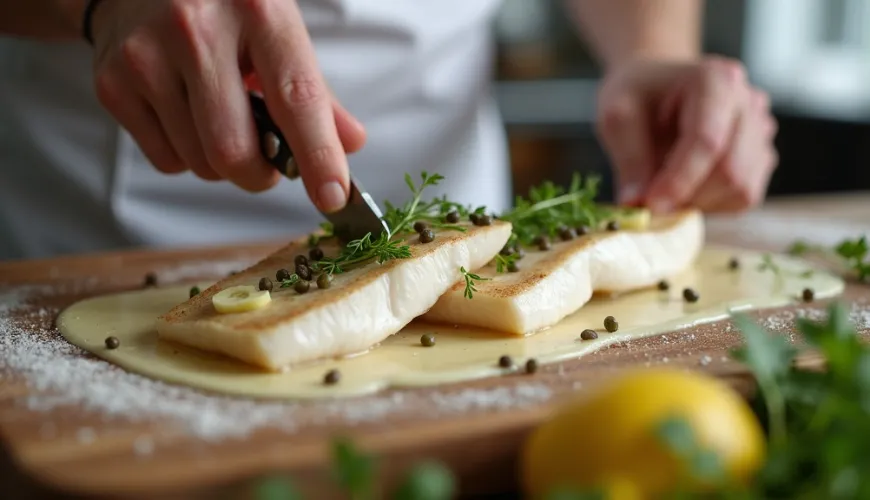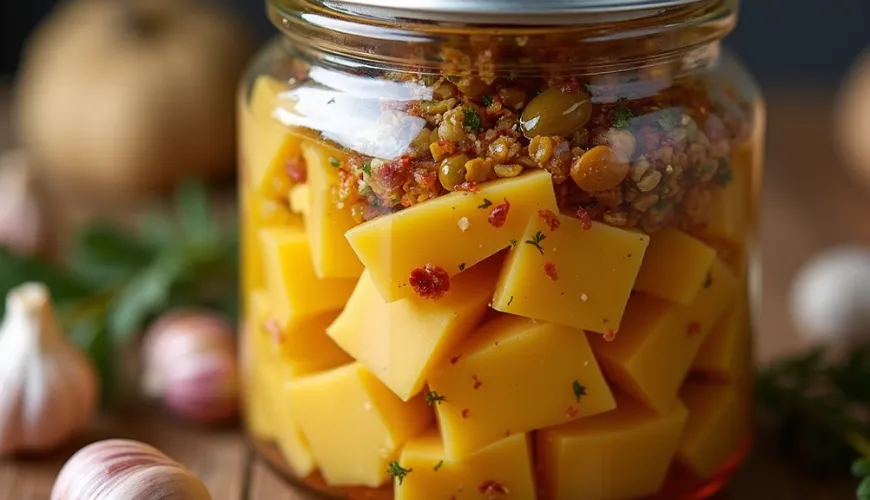
A Recipe for Marinated Cheeses That Will Impress Your Wedding Guests

The Scent of Summer in a Jar - Pickled Cheeses as a Homemade Delicacy
When it comes to pickling, most people think of cucumbers, beets, or pickled sausages. However, in recent years, pickled cheeses have gained increasing popularity – a delicious treat that combines the creaminess of dairy products with the spicy aroma of herbs, garlic, and quality oil. With just a few simple ingredients and a bit of patience, you can prepare a delicacy at home that will delight guests at a party or during a quiet evening on the terrace.
Interest in pickled cheeses is also rising because they fit perfectly into the concept of a sustainable household. They are easily preservable, can be made from local ingredients, and require no special equipment. Moreover, they are a great way to use up leftover harder cheeses that would otherwise go to waste. Whether you are inspired by a recipe from the popular magazine Apetit or create your own pickled cheese mix, the result will likely pleasantly surprise you.
Which Cheeses are Suitable for Pickling?
When you set out to prepare pickled cheese, the absolute basis is the correct choice of the cheese itself. Not every type is suitable for oil – the ideal is a firmer, semi-hard to hard cheese that does not fall apart and beautifully absorbs all the flavors of the marinade. Here are several great options. For instance, Hermelín or Camembert – these creamy, gently ripening cheeses are an absolute delight in oil and develop a pleasantly spicy note after a few days.
For lovers of saltier tastes, there are Balkan cheese or feta, which pair wonderfully with olives, sun-dried tomatoes, and a whole host of Mediterranean herbs – this combination simply never disappoints. If you prefer something harder that lasts longer in the marinade, you can opt for Edam, Gouda, or Cheddar – these cheeses pair excellently with spicier ingredients like chili or Dijon mustard. And then there’s a whole chapter in itself: smoked cheeses. These already have enough character on their own, but when pickled with a bit of garlic, onion, and fragrant spices, a true delicacy is created.
It's possible to combine different types and create a pickled cheese mix that satisfies diverse tastes. For example, one jar can contain slices of Edam, pieces of smoked cheese, and Hermelín – each layer complemented by different spices, creating a true symphony of flavors.
The Secret of Flavor Lies in the Marinade
What makes pickled cheeses in oil so exceptional is the marinade itself. Not only does it extend the shelf life, but it also adds character to the result. The base is typically quality vegetable oil – most commonly sunflower or rapeseed for a neutral taste, or olive oil, which adds a Mediterranean touch.
If you want to add a real zing to the cheeses, freshly sliced onion or garlic should not be missing from the jar – ideally, the pressed kind, which beautifully releases its aroma. Those who like a bit of a kick will reach for chili or jalapeño peppers. To make the flavor play on more strings, add a few sprigs of thyme, rosemary, or perhaps bay leaf with allspice. And finally, the classics must not be missing – pepper and mustard seeds, which beautifully tie everything together.
Every recipe for pickled cheese can be unique. Much depends on the ratio of ingredients, the chosen additives, and the length of marinating, which depending on the cheese used, can range from three days to two weeks.
One Recipe? Better Have Three
It's no coincidence that phrases like “pickled cheese recipe Apetit" or “homemade pickled cheese like from a pub" are spreading among people. Every recipe has its charm. Some prefer the version with Hermelín and onion, while others lean towards Balkan cheese with olives. Here is a simple recipe for pickled cheeses in oil that you can adjust to your liking:
Homemade Pickled Hermelín with Garlic
Ingredients:
- 4 pieces of Hermelín
- 1 red onion
- 4 cloves of garlic
- 1 teaspoon of sweet paprika
- 1 teaspoon of mustard seeds
- 1/2 teaspoon of crushed chili (optional)
- 3 bay leaves
- several black peppercorns
- several sprigs of thyme or rosemary
- 300 ml of sunflower or olive oil
Instructions:
- Cut the Hermelín into halves or quarters. Peel and thinly slice the onion and garlic.
- In a clean jar, layer the cheese, onion, garlic, and spices. Lightly sprinkle herbs and spices over each layer.
- Finally, pour oil over everything so that all ingredients are submerged.
- Close the jar and let it rest in the fridge for at least 4–5 days, ideally a week.
The result is excellent with fresh bread, fresh vegetables, or as an accompaniment to wine or beer. And if you're tempted by something a little different, you can create your own pickled cheese mix recipe – just combine different types of cheeses and adjust the spices to taste.
A Practice Story - Cheese Hit at a Wedding
At a small summer wedding in South Bohemia, they decided to replace the classic buffet with unconventional refreshments. Alongside homemade bread, vegetable spreads, and fruit skewers, three jars labeled “Cheese Bar" appeared. One contained Hermelín with onion, the second Cheddar with jalapeño, and the last a mix of Balkan cheese with olives and sun-dried tomatoes. Guests could help themselves as they pleased, and the combination of flavors received enthusiastic responses. “I must try this at home,” noted one guest while reaching for the third slice of bread.
This story shows that pickled cheeses are not just a homemade delicacy but can also become an original element at festive occasions. Moreover, they can be prepared in advance, so hosts don't have to stress at the last minute.
Sustainability and Homemade Production
In today's world, where more people are trying to reduce packaging, limit food waste, and support the local economy, homemade pickled cheeses represent an ideal step towards a more sustainable kitchen. They can be stored in reusable jars and prepared from locally available ingredients. Additionally, they make a great gift – a nice jar, a handwritten label, and a homemade treat can easily replace a purchased gift that often ends up unused.
And how long do they last? If the cheese is completely submerged in oil, stored in a cool place, and the used vegetables are fresh, the shelf life can be several weeks. But let's face it – they rarely last that long because they are usually eaten much sooner.
Inspiration from Apetit and Your Own Imagination
One of the frequently searched terms is “pickled cheese recipe Apetit”, and it's no wonder – the Apetit magazine has long inspired home culinary creativity. Their recipes are tried and tested, well-balanced, and often combine classics with a modern approach. However, if you feel like experimenting, there's nothing easier than creating your own version. Add sun-dried tomatoes, olives, walnuts, or even a sprig of lavender – the possibilities are almost endless.
As the renowned French chef Auguste Escoffier says: “Cooking is an art, but also a daily joy.” And pickled cheeses perfectly embody this idea: simple preparation, room for creativity, and a result that delights all the senses.
So whether you're inspired by a classic pickled Hermelín recipe or create your own cheese mix in oil, one thing is certain – this treat will soon become a staple in your fridge.

